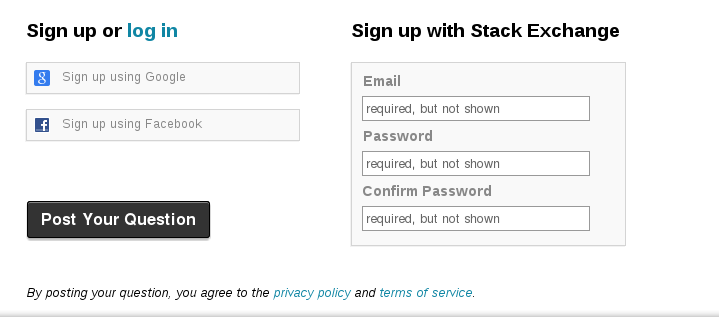Since its inception Stack Exchange has tried to make it as easy as possible to ask a question, most of the time. This was done by implementing the concept of an "unregistered" user, identified only by a cookie, who otherwise does not have to log in to a Stack Exchange site.
The unregistered user does indeed make it easy for anyone to ask or answer a question. Unfortunately, it has a number of problems, which frustrate the guest users, discourage community participation, and encourage lower quality.
User Experience
- Guest users who clear or lose their cookies can no longer comment on their posts or accept an answer on their questions. The SE network has many thousands of such "lost" accounts and their associated questions and answers, and since the account is "unregistered" there isn't an obvious way to recover the account. The hapless users then create new accounts, registered or unregistered, post answers as comments, need approval to edit their own questions, etc.
- Guest users sometimes register with a different email address than the one with which they made their first contribution, resulting in two accounts. Or they run into a bug which causes them to have two accounts anyway. These accounts then need to be merged, but the process to do this is also non-obvious to the user and the tool is no longer accessible to moderators.
- Guest users cannot take ownership of a migrated question or answer without first registering on the original site, then signing in on the new site with the same credentials, and hoping that Stack Exchange associates them to the same profile properly (which sometimes doesn't happen). Merging profiles in this scenario, different from merging accounts, is another non-obvious process which even some moderators are unaware exists; the user is likely to be hopelessly lost.
- Not to mention all the various bugs and edge cases in the system which users sometimes stumble upon. These all have to be dealt with, the user becomes confused and frustrated, and that funny smell in the office just might be the code...
Quality
- Overall, the quality of contributions from guest users is significantly lower than that from users who sign in to accounts,(1) (2) which is why some sites already do not allow unregistered users to ask questions. Low quality questions make regular answerers very unhappy. Low quality answers also are a pain, but to a lesser extent.
- The existence of the post as guest feature implicitly encourages low quality, drive-by contributions. Because little effort needs to be put into the post, and the user has no connection to the community, this is very often what happens. Many guest users do not respond to comments and requests for clarification, do not accept answers, and do not return to the site once their question has been answered. As described above, sometimes it may simply be impossible for them to do so.
These things being so, it should therefore be required for anyone to register or sign in to an account before their question or answer is posted, anywhere on the network.
This does not mean that users should not be able to type in their question or answer before registering or signing in; that could remain in place below the textarea, as it is now, or it could be altered in some way. One possible way to do this is to simply replace the Post as guest form with a signup form.

Whatever the specific user experience, it should be as easy as possible for a new user to sign up or log in.
Pros
- New users must be more motivated to join the site to make their first contribution successfully. This may discourage some people who would otherwise have contributed low quality worthless questions or answers. While this seems to be the case on the few sites which already prohibit questions from unregistered users, it is ultimately difficult to measure.
- The process of obtaining an account on a Stack Exchange site can be simplified somewhat. Since the account/profile system is already a Byzantine labyrinth with many traps for the unwary, the simplification implied by this proposed change can only help.
Cons
- New users must be more motivated to join the site to make their first contribution successfully. This may discourage some people who would otherwise have contributed high quality valuable questions or answers. While this probably would only rarely be the case, it is ultimately difficult to measure.
- There might have been another down side to this, but if there was I've forgotten it.
